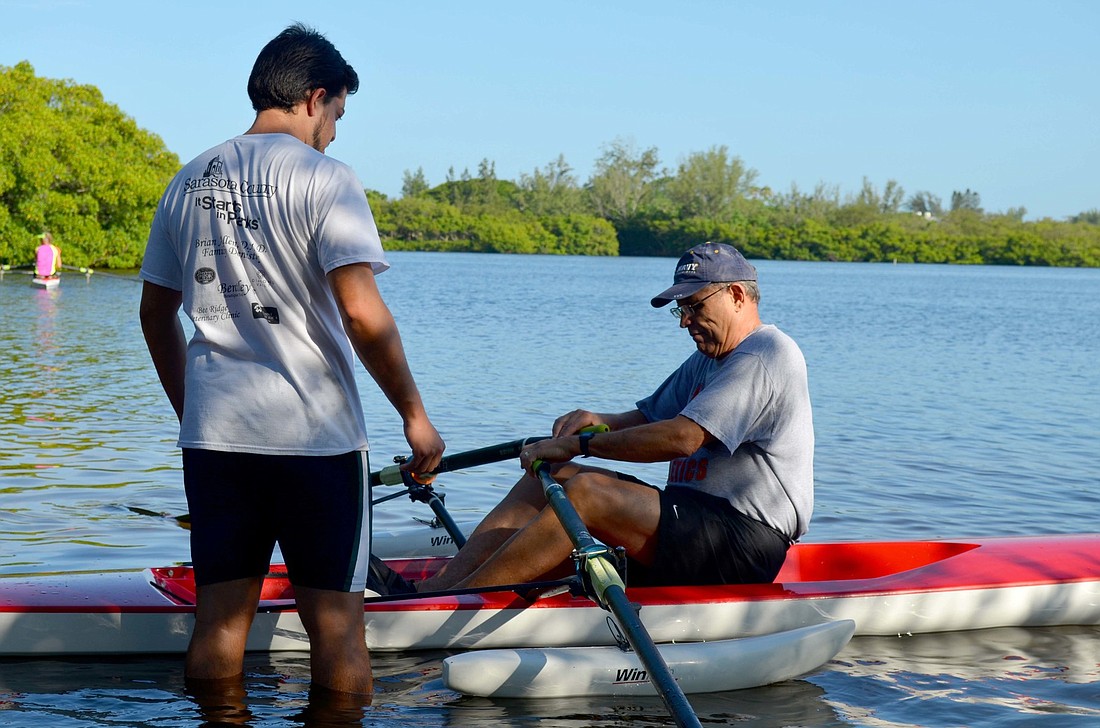- November 25, 2024
-
-
Loading

Loading

At first, Jack Gerber could hardly hold onto the oar. Sitting in a modified boat, specially equipped with stabilizing pontoons and foot straps, at the Sarasota Rowing Club in Osprey, Gerber struggled to complete even a few strokes. It had been three years since the retired Army colonel experienced a stroke in 2008, which left him unable to use most of the left side of his body. After searching for physical rehabilitation programs in the area, Gerber learned about Sarasota Adaptive Rowing — a program that offers rowing training and coaching to people of all physical abilities. As a lifelong runner, Gerber says the athletic nature of the program appealed to him, and he decided to get involved.
Now, two years after his first voyage out in a boat, Gerber’s improvements are impressive.
“When I first started, I could do maybe five strokes,” he says. “And, even then, I was struggling. Now, I can row 2,000 meters. I can probably row 1,000 meters without stopping. It’s been a real positive thing for me.”
Joe Dobson, Gerber’s coach and the founder of the program, says seeing that kind of improvement is an inspiration.
“The progress he’s made is meteoric,” says Dobson. “It’s fabulous to see these athletes not looking at their disabilities, but focusing on their abilities.”
Dobson, a retired Navy officer and rowing coach of more than 23 years, founded the program in February 2011, as a division of the able-bodied Sarasota County Rowing Club and chapter of Friends of Sarasota County Parks.
“We realized that a lot of people love rowing, but that it wasn’t available to disabled people,” says Dobson. “The joy of rowing and being on the water is beautiful, and feeling the oar connect with the water is delightful. We wanted to extend that opportunity to adults of all physical capabilities.”
Dobson works with a staff of volunteer coaches to help adapt both the training and equipment to the individual needs of the athletes. Staff members use a FISA-standardized classification process to determine each athlete’s capabilities and limitations before he begins training.
Some rowers require leg and foot straps to keep them stabilized; others need special adaptive seats or pontoons to help balance the boat. Dobson says learning how to best coach and outfit each athlete is one of the most gratifying aspects of the job.
In one case, they applied special knobs at the end of one of the athletes’ oars. The modifications helped Carlen Olson, who is blind and has diminished sensation in her hands, have a better sense of the orientation of her oar in the water.
“It’s hard work,” he says. “But the reward I get is far greater than any of the effort. When you see the smile on someone’s face the first time they get the boat to move, it’s incredible.”
The program currently consists of three rowers. Due to the one-on-one nature of the coaching required, Dobson says he hopes to recruit more volunteers to help the program continue to expand. And, with ADA-compliant features such as ramps and docks being added to rowing facility at Nathan Benderson Park, Dobson says he would be able to serve more athletes, especially those in wheelchairs.
“I love doing this, because I love seeing the difference it makes in people’s lives,” he says. “Rowing is my passion in life, and I want to be able to share it with as many people as possible.”
"I love doing this, because I love seeing the difference it makes in people’s lives. Rowing is my passion in life, and I want to be able to share it with as many people as possible."
— Joe Dobson, founder of Sarasota Adaptive Rowing